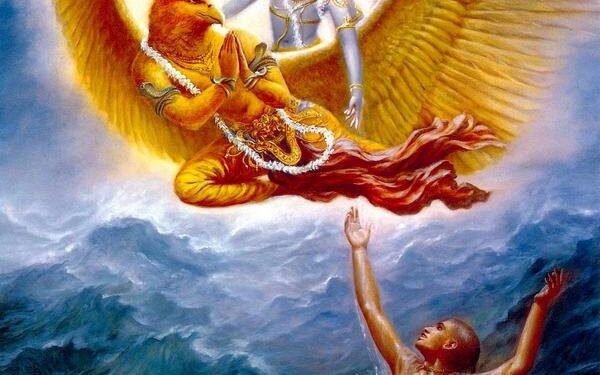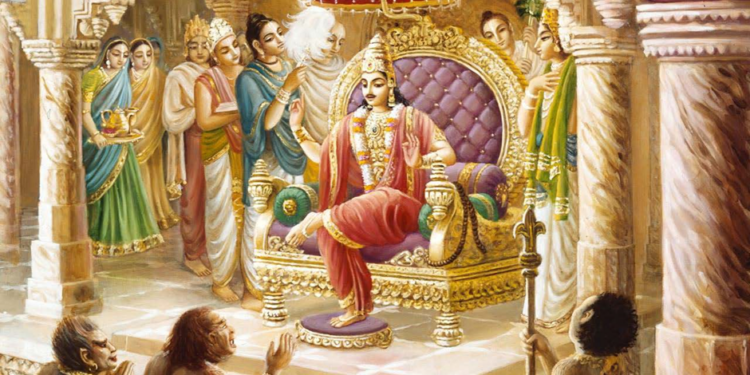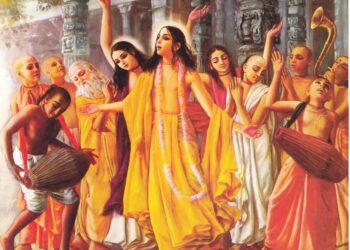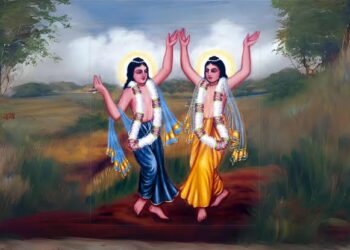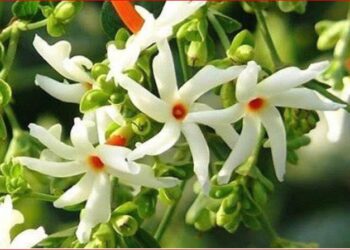1.112.20. A servant suffering from all these bad points or from anyone of them should be summarily dismissed – devoid of patience, dishonest, cruel-tempered, speaking ill of others, haughty, gluttonous, roguish, greedy, inefficient and cowardly.
1.112.21. The king shall keep in his fort strong weapons of all types and then try to conquer his enemies.
1.112.22. If he is not well equipped he should make peace with his enemy for a period of six months or a year and when he is well equipped he shall attack the enemy.
1.112.23. If a king engages foolish persons in various offices the results will be ignominy, loss of wealth and hell after death.
1.112.24. Whatever the king does himself or whatever his servants do meritorious or sinful, the king has to reap the fruits thereof. He will flourish or fall as the case may be.
1.112.25. Hence, a king should employ intelligent and capable men in offices of virtue or wealth for the welfare of cows and brahmanas in the state.
Suta said:
1.113.1. One should employ only the capable servant and not the inefficient. All good qualities can be found in a scholar and all faults in a fool.
1.113.2. One should always sit in the company of the good and associate with them. Discussions and friendship should ever be with the good and not with the wicked.
1.113.3. Even in a prison one should associate only with the learned, the humble, the virtuous and the truthful. Outside, he should never associate with the wicked.
1.113.4. Completing all works left unfinished he shall become wealthy. He should make it a point to complete unfinished tasks.
1.113.5. Like the honeybee that sucks honey but does not cause the fall of the flower the king should take revenue from the realm without harming it. The cowherd leaves something for the calf and milks the rest. Similarly, the king should milk the earth but leave plenty for the calves, i.e. the subjects.
1.113.6. Just as the honeybee collects honey from a number of flowers so the king should gather wealth taking a little from each.
1.113.7. The anthill, honey, the moon in the bright half and alms wax little by little.
1.113.8. Seeing that collyrium and ink, used though very little every day, become exhausted after some time, and that the anthill flourishes day by day, one should be careful in not wasting one’s time. One should engage oneself in activities of charity or self-study.
1.113.9. A vicious and lustful man shall find hundreds of obstacles even in the forest; but if he can control his five senses he can practice penance even in his house. He who is engaged in activities not censurable and he who is free from passion can make his house a hermitage.
1.113.10. Virtue is protected by truth, knowledge by further acquisition, a pot by frequent cleaning and a family by good conduct.
1.113.11. It is better to stay in the forest of Vindhya, to die without partaking of food; it is better to sleep in a spot infested by serpents or to leap into a well; it is better to plunge into a whirlpool or a dangerous water current than to say “Please give” or beg for a sum of money from one’s own kindred.
1.113.12. Riches dwindle when fortune dwindles and not by enjoyment; if merit had been acquired before, riches will never perish.
1.113.13. Knowledge is an ornament to a brahmana; a king is the beautifier of the world; the moon is an ornament of the sky; a good conduct is an ornament to everyone.
1.113.14. Bhima, Arjuna and others were born as princes, they were pleasing and delightful like the moon; they were valorous, truthful, brilliant like the sun and were kindly protected by Lord Krsna. Even they were subjected to abject misery by the influence of evil planets; they had to beg for alms; if fate is adverse who is capable of what? The current of previous actions tosses everyone about.
1.113.15. Obeisance to karma which forces Brahma to work like a potter in the bowls of cosmos, by which Vishnu was cast into distress of ten incarnations; by which Rudra was compelled to beg for alms with a skull in his hand and at the behest of which the sun goes round and round in the sky.
1.113.16. The donor was king Bali, the receiver Lord Vishnu himself, the gift consisted of whole Earth and that too in the presence of learned brahmanas. What did he get in return? Only bondage. O fate! obeisance to thee – who workest as it pleasest thee.
1.113.17. The mother is goddess Laksmi herself; the father is Lord Vishnu; still if the son (Cupid) were to be of crooked mind, who is to be punished for the same?
1.113.18. Man enjoys only the fruits of his previous actions; whatever he has done in the previous births has its reactions now.
1.113.19. The happiness is enjoined by oneself, the sorrow too is enjoined by oneself; even the womb selected by him is in accordance with the action of the previous birth.
1.113.20. A man can never forsake the action done by him far into the sky, or deep into the sea or high on the mountain; whether he is held by his mother on her head or kept in her lap.
1.113.21. Even Ravana perished at the hands of time. Ravana whose fortress was the mountain Trikuta, the moat – the very ocean; soldiers – Raksasas; the action of the highest order; and the sastra propounded by Usanas [Sukra].
1.113.22. Everything happens in the age, time, day, night, hour or moment as is ordained beforehand; not otherwise.
1.113.23. Whether people go up in the sky, or deep in the nether world; whether they traverse all quarters, they will not get what is not given by karma.
1.113.24. The learning of bygone days, the money made over as gift and the actions done before – these run ahead of a person who walks at speed.
1.113.25. Actions alone are of consequence. See Janaki (Sita), whose marriage was celebrated when the stars and planets were ascendant and the lagna (i.e. auspicious hour) was decided by sage Vasistha himself, had to undergo miseries.
1.113.26. Auspicious signs, characteristic marks are of no avail when karma comes into clash; for Rama who had stout muscular calves, Laksmana who was as swift as sound and Sita who had thickly grown glossy hair – all these had to suffer a lot.
1.113.27-28. Neither the son with Pinda-dana and other rites nor the father with various rites for the welfare of the son can ward off the adverse influence of karma. In the physical bodies born as a result of karma, different kinds of illness, physical or mental, fall in quick succession like the shafts discharged by a skilful archer. Hence, a courageous man should view objects in the light of shastric injunctions and not otherwise.
1.113.29. In every birth, a man reaps the fruits of his previous merits and demerits in the respective ages of infancy, youth or old age at which the actions had been performed.
1.113.30. Just as a gale blows a boat, the karma drags a man against his wish even from foreign countries to the place where he has to reap the fruits.
1.113.31. A man necessarily gets what he is destined to get. Even a god is incapable of stopping it. Hence, I do not bewail or am not surprised at the events. The line of fate cannot be erased.
1.113.32. When chased, a serpent escapes into a well, an elephant to the trunk (to which it can be tethered); a mouse to its hole; but who can fly from karma which is quicker than all these?
1.113.33. A well-assimilated knowledge never diminishes; it increases on being imparted to others like the water in a well which increases when water is drawn out.
1.113.34. Riches acquired virtuously become stable; they flourish still more with virtue. Hence, when you aim at riches, remember this and seek virtue. You thus become great in the world.
1.113.35. None becomes miserable, if seeking virtue, he undergoes the same hardships as a poor layman does seeking food.
1.113.36. Of all purities, purity of food is excellent. If a man incurs impurity by taking unwholesome food, he cannot be cleansed with clay or water or any other substance of cleanliness.
1.113.37. These are five cleansing agents – truthfulness, pure mind, suppression of sense organs, sympathy with all living beings and water, the fifth of the series.
1.113.38. He who maintains truthfulness and purity finds an easy access to heaven. Truthfulness is superior to even horse sacrifice.
1.113.39. A man habitually wicked in deeds, with his conscience benumbed with evil thoughts, cannot be cleansed with a thousand lumps of clay or a hundred pots of water.
1.113.40. He who keeps his hands and feet clean, his mind under perfect control, and acquires learning, penance and fame, reaps the fruit of pilgrimage.
1.113.41. The characteristics of a saintly man are: he is not elated much when honoured, he does not become angry when slighted, he does not speak harsh words in anger.
1.113.42. No one feels satisfied at the outset on hearing wholesome advice at the proper time from a poor man though intelligent and sweet-voiced.
1.113.43. What men are not destined to get cannot be secured by them through mantras, strength, valour, intellect or manliness. What is there to lament over?
1.113.44. I have secured something unsolicited. When I sent it back, it went away from where it had come. What is there to lament over?
1.113.45. During nights birds flock together on a tree for rest. In the mornings they go to different quarters. What is there to lament over?
1.113.46. All have the same destination. All are proceeding there. If one among them goes more quickly what is there to lament over?



